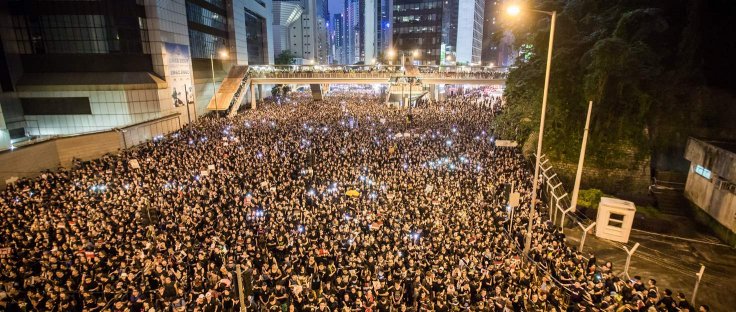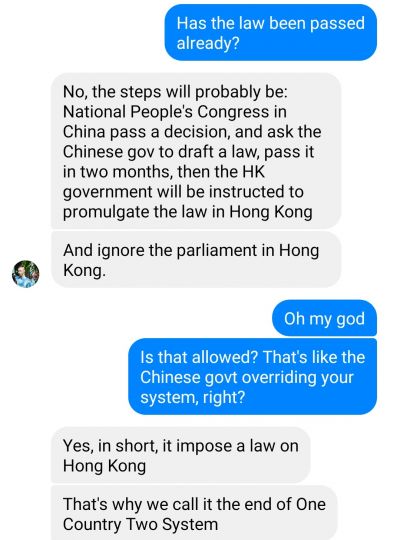While Hong Kong became once again one of the trending topics on social media due to the protests against mainland China's plans to introduce national security laws, several videos showed up on how the protesters have been beaten on the streets.
Secretary for Security John Lee said, "Terrorism is growing in the city and activities which harm national security, such as 'Hong Kong independence' become more rampant. In just a few months, Hong Kong has changed from one of the safest cities in the world to a city shrouded in "the shadow of violence."

Meanwhile Justine Balane, the Secretary-General of the Philippines Akbayan Youth posted the recent conversation she had with a resident-cum-friend in Hong Kong, Johnson Yeung, who is a Human Rights advocate and Board Member of the Amnesty International Hong Kong.
As per the screenshot of the conversation, Yeung said that there is no way to stop the law to be implemented which means, "Hong Kong will enter an authoritarian ear like the Marcos Era," at the time when Ferdinand Marcos, ruled as a dictator under martial law from 1972 to 1981. It should be noted that by the end of this era, the Philippines was experiencing a debt crisis, extreme poverty, and severe underemployment. Yeung added, "we need to learn how to fight under authoritarianism."
The tweet says: "'END OF ONE COUNTRY, TWO SYSTEMS' My friend @hkjohnsonyeung on China's plan to impose a National Security Law on Hong Kong. You read that right. China is deciding for HK citizens. If this happens, they can take HK critics and torture them in China. #StandWithHongKong"




Hong Kong Extradition Bill 2019 and National Security Law 2020
Last year, thousands of protesters gathered on streets of Hong Kong after the proposal of the controversial extradition bill that would have allowed Hong Kong to extradite criminal suspects to places it does not have a formal extradition agreement, including Taiwan, the Chinese mainland and Macau. The critics of the bill had feared that the extradition to mainland China could subject people to random detention and unfair trials.
Later, when in December 2019 the Coronavirus hit China and then started to infect millions of people in the world the protest movements were automatically dominated, and all the countries, including China started battling the natural enemy. But as soon as China controlled the virus outbreak in the country, Beijing introduced the national security law in Hong Kong that sparked fears over the potential impact on Hong Kong's freedom.
Under Article 23 of Basic Law, the mini-constitution governing the territory, the Hong Kong government must enact laws to prohibit acts like treason, sedition, secession, and subversion against the Chinese government and the theft of state secrets. In 2003, when the Hong Kong government tried to introduce national security legislation, a huge protest took place, involving around 500,000 people. But as the local government failed to get such laws through the legislature, China now wants to take matters into its own hand.
Willy Lam, an adjunct professor at the Chinese University of Hong Kong's Center for China Studies, told TIME, "I think they have lost patience that Article 23 can be passed by the Legislative Council. This is a direct way of imposing a national security law in Hong Kong."
Hong Kong doesn't want this
Videos and images showing how protesters are brutally beaten up on streets continue to surface on social media, while people keep discussing what will be the fate of this "one country, two systems."
One Twitter user posted a video of how a woman was tortured on the street stating that "Absolutely sickening. The West's beloved "freedom fighters" in Hong Kong stalk, surround, and beat a defenseless young woman."








